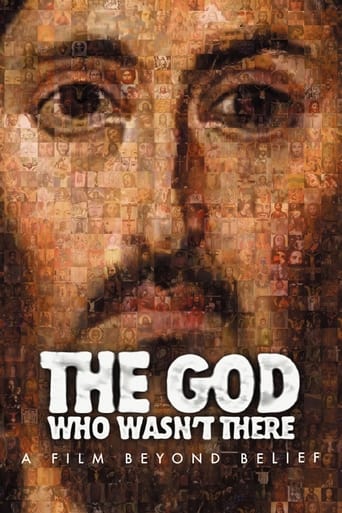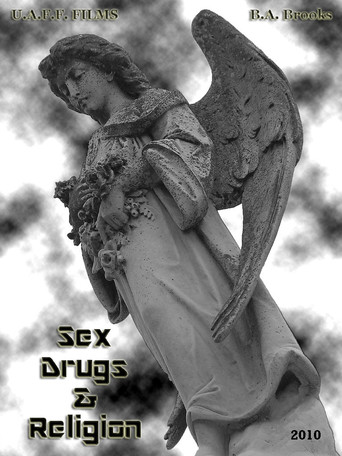

The God Who Wasn't There (2005)
Did Jesus exist? This film starts with that question, then goes on to examine Christianity as a whole.
Watch Trailer
Cast
Similar titles



Reviews
To me, this movie is perfection.
Excellent, Without a doubt!!
best movie i've ever seen.
It’s not bad or unwatchable but despite the amplitude of the spectacle, the end result is underwhelming.
The film is Brian Flemming's personal nightmarish search for answers, who as a disgruntled boy never came to terms with his personal problems caused by his Protestant teachings, never bothered to check what they were teaching. So the best way for him to deal with his problems was to deny everything including the existence of historical Jesus.He claims that if the Church was wrong about the sun revolving around the earth it was wrong about the historicity of Jesus Christ. Catholic Church deals only with questions of faith and morals and never claimed to be a scientific institution, although Catholics have always been at the front end of scientific discoveries throughout the two thousand year history. First universities were opened by the Church back in 11 -12 centuries. The entire human race believed the sun revolved around the earth. In fact 1 in 4 Americans today believe the same according to a survey.He tries to demonstrate that Christianity has not invented anything new and the ideas of a saviour and other parallels with Christianity are found in ancient myths like the cults of Mithra, Osiris and Dionysus. These pagan gods belong, of course, to various ancient civilisations - Roman, Egyptian and Greek. Parallels with Osiris and Dionysus are so generic that they can be found in almost any religion. As for Mithra there isn't a single written source in existence from that cult. What survives are ambiguous stone inscriptions that historians still in disagreement about as to their meaning. He conveniently picks the Roman Mithra that has the most "parallels" with Christianity. This cult was followed by the Roman soldiers in 1-4 centuries AD. Yes, AD. That's AFTER the beginning of Christianity. The only written sources that survive of the Roman Mithra cult (a relative of Persian Mitra) are Christian sources that can hardly be turned against the writers who wrote them!He fails to see that Judaism is an ancient religion (if not the most ancient) and Christianity is the organic continuation of it. Judeo-Chritianity span almost four thousand years from Abraham, and in fact go back to Noah (24th century BC). The beliefs of this religion predate even those earliest surviving sources of Persian cults of Mitra by at least several hundred years. Animal sacrifice, bread and wine offerings, a Saviour, Heaven and Hell and many other concepts have always been part of this ancient religion. Longing for their promised Saviour by the Jews go back to the origins of that religion as evidenced in their books. In fact all pagan societies outside of Jewish of that era were so deeply cruel, immoral and perverted that nearly all of them were longing for some kind of a divine saviour, naturally coming up with various stories and man-made prophecies which would eventually turn into cults. Jews even resisted their religion throughout their entire ancient history. Besides, Judaism throughout its entire existence, was in constant contact with other civilisations (Egyptian, Mesopotamian, Roman, etc.), and an exchange of religious beliefs was an ordinary matter. Jews were always adopting various pagan cults. Similary, ancient accounts of the Great Flood and the Ark filled with animals can be found outside of Jewish tradition in ancient Greek, Hindu, Mesopotamian cults.Another point is, if one thing is similar to another does it mean they are identical? A human is similar to a monkey. Does it mean a human is a monkey? And if similarities exist in attributes that belong to humans or the facts of lives of one person and another are similar, does it mean one of them never existed? Likewise, attributes that belong to gods would be similar as what we lack in our human nature we would attribute to gods, even the invented ones.Using the same false logic we can "prove" that Napoleon never existed. It's all a sun myth, because of similarities. In Paris there is a column with Napoleon's statue with the inscription: "Neapolio, Imp. Aug.". Splitting of the name gives us "Ne", Greek particle of affirmation, and "Apolio", and we get "True Apollo". So Napoleon was god Apollo. Both Apollo and Napoleon were born on a Mediterranean island (Delos and Corsica). Apollo had three sisters and two wives (one - the earth, the other - the moon) and Napoleon had three sisters and two wives. Apollo was a sun god of light; the sun passes 12 signs of the zodiac and Napoleon was effectively a dictator for 12 years (1802 to 1814). Napoleon had 12 Marshals like the 12 signs of zodiac. The sun is strongest in the south and weakest in the north and Napoleon was defeated in Russia. So he is simply a sun myth just like Jesus of Nazareth.Mr. Flemming interviews Bible Christians to see what they know about the spread of Christianity. And, behold, they don't. What can one expect from the form of Christianity that have no foundation in history? His claims that since Apostle Paul didn't write about the life of Christ Christ, therefore, He never existed, that The Passion of the Christ film is evidence that Christians are blood thirty - these are ridiculous beyond belief. Just as his understanding of the denial of the Holy Spirit being an unforgivable sin is completely wrong and just hilarious. But he never bothers to check his "facts". And by his logic, because there is a gap between the years of the life of Jesus and the Gospels written... Jesus never existed. If someone writes a biography of someone who lived 40 years before does that prove he never existed?This is a truly sad story of a man who never looked anywhere else of what Christianity is all about and is still going blind - just as he was in his teenage years. The film should have been more appropriate called "My Mind That Wasn't There".
The first thing that is usually revealed in any summary of this film (for those who don't already know, the spoiler box is checked) is that Brian Flemming is an ex-fundamentalist Christian, and that, of course, immediately gives him an agenda. Maybe he's angry at being sold, what he now perceives to be, a bill of goods? Maybe he's out for revenge on the grade school that indoctrinated him initially (and at some abuse which is vaguely hinted at?).Regardless, he manages to articulate the fallacy of Faith that virtually all Judeo-Christian religions fall back on when faced with a question they can't answer factually: namely, "Well, you have to have faith" or --- the one I got most often when questioning parts of my Catholic upbringing --- "It's too complex for humans to understand...if you understood it, you'd be God." Once you get past this implausible answer --- and it's difficult, I'll grant you that; it's akin to being brainwashed --- it's pretty horrifying what the human mind is capable of accepting simply because "it's always been taught that way." Flemming makes some really good arguments, most notably that the Jesus story follows much of the exact same story arc of many pagan gods before him, and the obliqueness of Paul/Saul's "conversion" and evangelical experience. He also throws us some of the many destabilizing and discrediting "sources" out there, including a guy who runs a Web site for people to write letters to their loved ones, explaining how they are missing because they have been taken up to heaven in the infamous "Rapture", and the head of Flemming's former school who cowardly ends the interview because Fleming has successfully backed him into a corner (oh, but he does have a rather fat paycheck residing on his ability to force feed a doctrine based on myth and legend to 1800 kids).Also, to contradict previous reviewers, Flemming does NOT "want" Christians to believe 100% in the bible, and joyfully endorse gassing gays, etc. He is merely saying that the concept of believing "halfway" in something is ludicrous. How can you rationally endorse one part of a doctrine and deny others? But the key word here is "rational." To call this an important subject is a massive understatement. Can anyone honestly say 9/11 wouldn't have happened if not for the fanatical belief in God? And that's only the tip of the slaughter iceberg, obviously.The one bright side to all this is that, at least it seems to me, more people are waking up to the fact that Judeo-Christian religions are the problem, not the solution, and are encouraging each other to think with their own minds before deciding how to exercise their FREEDOM (and yes, it is a freedom, something that can't be dictated by a bunch of crazed fascists hiding behind a cross) to decide what to believe. That's largely due to the internet and also, to brave filmmakers like Flemming. Bravo.
An hour of the pot calling the kettle black. Misunderstandings and half- truths haphazardly stapled together as "proofs" against Jesus. Nearly every serious historian agrees there is ample evidence that Jesus existed, regardless of their personal religious beliefs.Just like Religulous and other atheist propaganda pieces, the self- absorbed ego freaks who make these things (notice, they're usually written by, directed by, starring, and presenting the beliefs of one person) fall into the exact same traps they accuse theists of making. The film starts with an inference that men in authority of the Catholic Church denied the now-known mechanics of the Solar System and were representative of God/the Bible/Jesus. The film goes on to make many ad hominem attacks (and/or sweeping generalizations), pointing out the ignorance of individuals who are portrayed as representative of Christians. Of course, the filmmaker gets to edit out any informed or intelligent remarks and edit in all the pauses and dumb looks he wants, on top of any actual stupidity or ignorance on the part of the interviewee. The film makes several appeals to popularity, positively interviewing atheist spokespeople and having a jolly inside laugh at the silly theists. It presents a logical leap of asserting since the Churches have been wrong and claim to represent the Bible, the Bible must also be wrong. Add to that the false dichotomy that since the Bible has now been supposedly proved wrong, then atheism must be correct.The examples are endless and are intellectually painful, so I'll leave them at what have already noted. This is just another atheist with an axe to grind, a Cliff's Notes understanding of the Bible, and copy-&- paste arguments from equally ignorant and self-worshiping atheist websites. (Don't get me wrong; I'm the first to admit a huge portion of the religious are ignorant and stupid.) The closest he gets to a debate with a Bible scholar is picking a fight with a nut-job administrator of a religious private school that doesn't teach the Bible with any accuracy.An interesting side note: When Galileo presented his theory to the Catholic Church, it was of a heliocentric universe, where everything - our solar system's planets, other stars, all the galaxies, everything - revolved around our sun. Galileo couldn't prove this (possibly since it's not true) to the satisfaction of the mathematicians and astronomers the Church had gathered for the occasion. So, the Catholic Church opted to cling to the previously-held false belief rather than latch on to the new false belief. The whole matter is purely academic, since the Bible is neither a church nor the clergy thereof.
The notion that there never existed a personage known as or modeled after a "Jesus Christ" is intriguing to say the least and deserves a better made "documentary" than this. I, too, have come to believe there never was such a person and have read some of Earl Doherty's discussion on the matter at his website so I was all gung-ho to see a film presentation of all the evidence, spliced in with commentary from the many great thinkers that agree with the premise. Boy, was I let down! This film is poorly made and -to put it bluntly - boring! The director clearly did not do his homework. Interviewing people on the street about Jesus was pointless, too. Why not talk to theologians? for example. There is so much ground to cover and so many, many talking points to explore but the director wastes precious minutes by, among other things, visiting the Christian school he attended as a youth followed by a poor imitation of ambush-style journalism in an interview with the schools director. This is a subject that deserves serious consideration and I await the filmmaker that deals with it as such.








